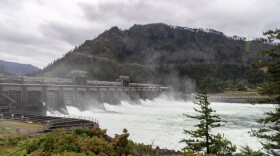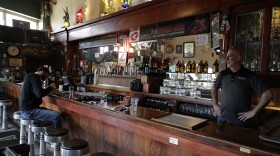Flush with cash, Washington state lawmakers return to Olympia next week with Democrats and Republicans disagreeing over how to spend the unexpected windfall.
A revenue forecast released in November showed projected revenue collections for the 2021-2023 budget cycle are $898 million above what had been originally predicted in September. And projections for the next two-year budget cycle that ends in mid-2025 increased by more than $965 million.
When the Legislature convenes Monday for a 60-day session it will be tasked with adjusting the $59 billion budget passed last year.
Republicans say it’s time to invest in Washington state’s aging transportation network of dilapidated roadways and an unreliable state ferry system.
“I, like a lot of us, thought we’d be looking at a recession,” House Minority Leader J.T. Wilcox said Thursday at the annual Associated Press Legislative Preview. But a combination of federal money for COVID-19 pandemic relief and a rebounding economy means lawmakers have plenty of options.
“We should spend those (funds) on our transportation infrastructure,” Wilcox said. “We all depend on goods and services that move around the state.”
Sen. Minority Leader John Braun, R-Centralia, agreed. He said the Legislature could use the new money to transition away from dependence on a regressive gas tax to pay for needs to repair and build roads and bridges.
“There’s a tremendous opportunity for the Legislature to step up and change the future of transportation in Washington,” Braun said.
The Republican leaders also advocated for cutting taxes in light of the new money available to the Legislature.
Democrats, who have majority control in the House and the Senate, say they'd like to spend the surplus helping those in need. House Speaker Laurie Jinkins also noted some of the new budget funds available are one-time infusions from the federal government and won't be available in future years.
The Tacoma Democrat said she'd consider expanding or improving a tax credit for working families and perhaps setting up a state loan program for young people, where they would have access to money at lower rates to help them with education or other needs.
Sen. Majority Leader Andy Billig, D-Spokane, said more support is needed to create affordable housing, improve child care access and address mental health issues.
He said lawmakers need "to invest in a continued, robust recovery, but making sure it works for everyone.”
Gov. Jay Inslee, who also spoke at the AP preview, touted his $815 million plan to address the affordable housing crisis. The Democrat's plan would contribute about $500,000 million to gaining permanent housing and shelters. It would also do things like provide money to clear illegal encampments and pay for utility bills for those facing hardship.
“I would commend these proposals to the Legislature,” Inslee said. "I hope we would succeed in taking a big bite out of homelessness this session.”
When the Legislature convenes much of its business will again be conducted remotely due to the surge of coronavirus cases fueled by the omicron variant. The number of lawmakers allowed on chamber floors will be limited and public access will be restricted.
Jinkins said she was disappointed to have to enact COVID-19 protocols and that the situation will be reevaluated constantly. She said she's committed to keeping people safe and working transparently.
Lawmakers were able to work effectively for the people last year, she said, “even in a fully remote session.”
While they appreciated the challenges the pandemic brings, Wilcox and Braun said implementing restrictions at the Legislature does impede access and hurts deliberations on important bills.
“Safety is an important thing," Wilcox said. “We also have to be able to be willing to show that this is not the new permanent normal.”






